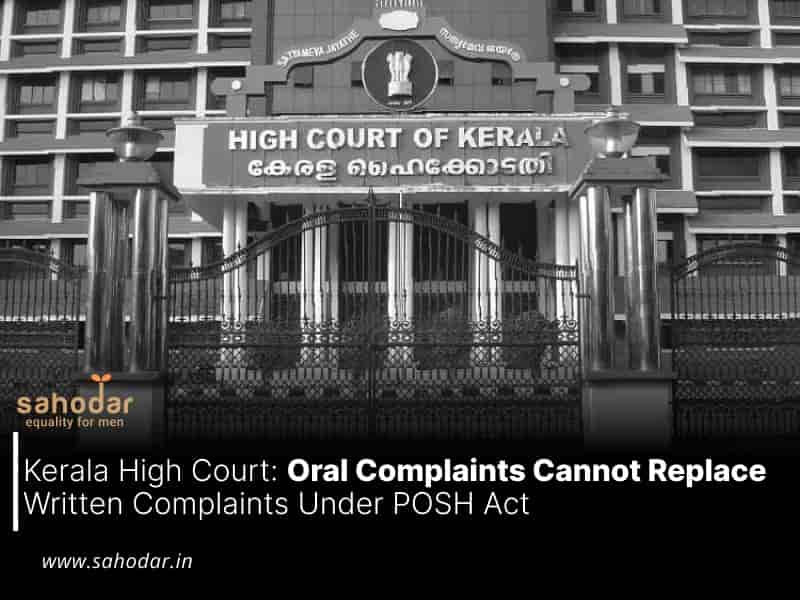The Court opined that while oral complaints may be given in exceptional circumstances, it cannot be a routine substitute for written complaints which are usually mandatory for inquiries under the POSH Act.
The Kerala High Court recently ruled that oral complaints of sexual harassment cannot replace a written complaint to initiate an inquiry under the Sexual Harassment of Women at Workplace (Prevention, Prohibition, and Redressal) Act, 2013 (POSH Act).
Justice P.G. Ajithkumar emphasized that Section 9 of the P0SH Act mandates complaints to be submitted in writing.
The judge referred to the High Court’s decision in Prasad Pannian v. Union of India, which allowed oral complaints in exceptional circumstances where the complainant is unable to provide a written complaint.
However, Justice Ajithkumar clarified that this does not imply oral complaints can generally replace written complaints.
The Court made this statement while canceling an inquiry report by a Local Level Committee under the P0SH Act against the managing director of an IT company.
The inquiry was based on an anonymous complaint. The Court pointed out that the alleged victim had not filed a written complaint to start the inquiry and that there was no evidence showing the complainant couldn’t file one.
“Therefore, in the facts and circumstances of this case, the oral complaints made by the 4th respondent (alleged victim) cannot be a substitute for the complaint in writing contemplated by Section 9 of the POSH Act. In that view of the matter, the inquiry conducted by the 2nd respondent becomes illegal,” the Court held.
The Court was hearing a petition filed by the managing director (MD) challenging the inquiry report prepared against him.
To provide context, the MD had previously terminated a woman employee for inadequate work performance. The dismissed employee contested her termination before a labor court, while the MD filed a case seeking to prevent her from entering the office premises.
Subsequently, an anonymous complaint was sent to the District Collector, making various allegations against the petitioner. This complaint was referred to the Local Level Committee, which initiated an inquiry under the PoSH Act.
As part of the inquiry, the committee interacted with the former employee, who accused the MD of workplace harassment driven by personal animosity. She also reportedly claimed that the MD himself spread lewd rumors in her name.
She denied that the MD had asked for sexual favors or molested her. The Court also noted that she had expressed doubts to the committee about whether this was truly a case of sexual harassment.
Despite this, the committee decided that the MD had created a hostile work environment and recommended that he apologize to the former employee and pay her compensation.
The petitioner challenged this decision in the High Court, also questioning Rule 7(6) of the PoSH Rules, which bars lawyers from participating in inquiry proceedings.
The Court ruled that the committee did not have jurisdiction under Section 11 of the PoSH Act to conduct the inquiry, as there was no written complaint from the alleged victim.
The Court also noted that the allegations did not seem to amount to sexual harassment.
“The dispute and harassment meted out on the 4th respondent were more relating to her employment and the reason thereof was the petitioner’s personal grudge against her. It was a labour dispute rather than a dispute connected to sexual harassment. The 4th respondent had duly taken up the matter before the police as well as the Labour Court,” the Court added.
The Court identified additional procedural mistakes by the committee, including not examining witnesses in the petitioner’s presence (instead, the interactions were conducted via phone).
This denied the petitioner his right to cross-examine witnesses, which violated the principles of natural justice.
The Court canceled the inquiry report, saying it went beyond the limits of the PoSH Act.
The Court didn’t rule on whether the PoSH rule banning lawyers from attending inquiries was legal. This was because the inquiry report had already been canceled, and the petitioner hadn’t strongly raised this issue.
However, the Court mentioned that the rule was added to protect the privacy of complainants in sexual harassment cases.
“Considering the scheme of the statute, its objective and the need to protect the privacy of the complainant almost in all cases, such a provision would have been included in the POSH Rules … I found above that (inquiry) report is untenable … the plea for declaring Rule 7(6) of POSH Rules unconstitutional becomes academic in this case … I leave that question undecided,” the Court said.

